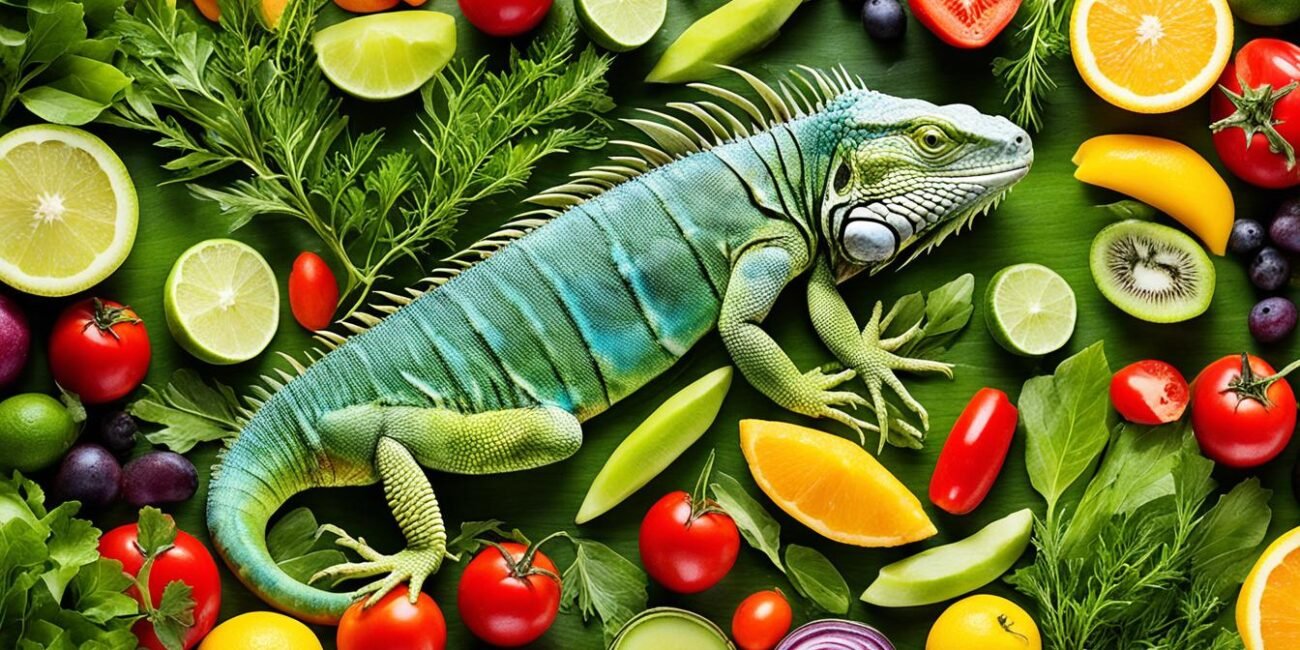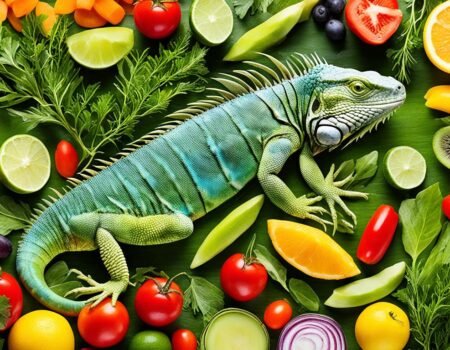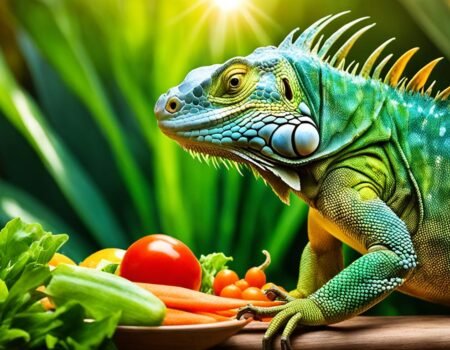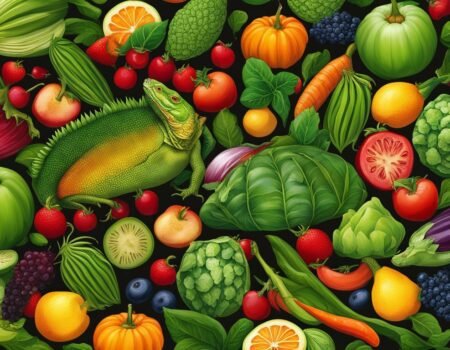Did you know that an improper diet can contribute to health problems in iguanas? These herbivorous reptiles require a well-balanced and nutritious diet to ensure their overall health and vitality. Their nutritional needs have evolved over time, and providing the right food is crucial for their well-being and longevity.
Key Takeaways:
- Feeding iguanas a variety of dark green leafy vegetables is essential for their diet.
- Fruits should only make up a small percentage of an iguana’s diet.
- Supplementing their diet with calcium powder and a multivitamin is necessary to prevent nutrient deficiencies.
- Proper hydration and access to fresh water are important for iguana health.
- Consulting with a veterinarian is crucial for tailored nutrition advice based on your iguana’s specific needs.
What Should Iguanas Eat?
Iguanas have specific dietary requirements as they are folivores, meaning they primarily eat leaves. In the wild, their diet consists mostly of plant material such as leaves from trees and vines, along with some fruits and flowers. These high-fiber foods are essential for their overall health and well-being.
Iguanas have a unique digestive system as they are hindgut fermenters. This means that they have specific microbes in their gastrointestinal tract that help ferment the high-fiber foods they consume. This fermentation process allows them to effectively absorb nutrients from the plant material they eat.
| Example of Suitable Plant Material for Iguanas | Example of Suitable Fruits for Iguanas |
|---|---|
| Collard greens | Apples |
| Mustard greens | Bananas |
| Kale | Grapes |
| Parsley | Strawberries |
It is important to note that the majority (80-90%) of an iguana’s diet should consist of dark green leafy vegetables. Some examples of suitable vegetables include collard greens, beet greens, mustard greens, kale, and parsley. These leafy greens provide essential vitamins and minerals for their daily nutritional needs.
Fruits should make up a smaller portion (less than 20%) of an iguana’s diet. Apples, bananas, grapes, and strawberries are some examples of fruits that can be offered to provide variety and additional nutrients.
The importance of a high-fiber diet
The high-fiber content in their diet aids in proper digestion and helps prevent health issues like constipation. It also ensures that they receive a balanced and nutritious diet that supports their growth and development.
Feeding Frequency for Iguanas
Feeding your iguana the right amount of food and at the appropriate frequency is crucial for their overall health and well-being. The feeding schedule for iguanas may vary depending on their age and weight. Here’s a breakdown of how often you should feed young and adult iguanas:
Young Iguanas:
Young iguanas have higher energy and nutritional requirements compared to adult iguanas. As a general guideline, young iguanas should be fed daily to ensure they receive adequate nutrients for growth and development.
Adult Iguanas:
Adult iguanas have lower energy needs and may not require daily feedings, especially if they are overweight or have a sedentary lifestyle. Feeding adult iguanas every other day can help prevent excessive weight gain and maintain a healthy body condition. However, if your adult iguana is active and within a healthy weight range, feeding them daily is also a suitable option.
It’s important to monitor your iguana’s weight and adjust their feeding frequency accordingly. If your iguana is gaining too much weight, reduce the number of feedings or switch to a lower-calorie diet. On the other hand, if your iguana is losing weight or appears undernourished, consult a veterinarian for guidance on increasing their feeding frequency or adjusting their diet.
Properly managing the feeding frequency for your iguanas is crucial to maintaining their health and preventing obesity or malnutrition. By providing them with the right amount of food at the right intervals, you can help ensure that your iguana receives the optimal nutrition they need to thrive.
Vegetable and Fruit Options for Iguanas
Iguanas’ diet should mainly consist of dark green leafy vegetables, comprising about 80-90% of their overall food intake. These vegetables are rich in essential nutrients and fiber that promote optimal health for your iguana. Incorporate vegetables such as collard greens, beet greens, mustard greens, kale, and parsley into their daily meals. These options provide a variety of flavors and textures to keep your iguana interested in their diet while ensuring they receive a well-rounded nutritional profile.
Fruits should make up a small portion, around 10-20%, of an iguana’s diet. Offering fruits as occasional treats can add variety and natural sweetness to their meals. Some suitable fruit choices for your iguana include apples, bananas, grapes, and strawberries. These fruits are not only delicious but also provide some additional vitamins and minerals to support their overall health.
It is crucial to avoid nutrient-deficient vegetables like iceberg lettuce and celery, as they do not provide sufficient nutritional value for your iguana. Instead, focus on incorporating dark green leafy vegetables that are packed with essential nutrients.
The Importance of Calcium-Rich Vegetables
Calcium is a vital mineral for the skeletal health and overall well-being of iguanas. Including calcium-rich vegetables in their diet is crucial to prevent calcium deficiencies or metabolic bone disease. Turnip greens and bok choy are excellent options to consider, as they are high in calcium content.
By offering a diverse range of dark green leafy vegetables, a carefully selected assortment of fruits, and incorporating calcium-rich options, you can ensure that your iguana receives a balanced and nutritious diet that supports their long-term health and vitality.
Sample Iguana Diet Plan
| Meal | Vegetables | Fruits |
|---|---|---|
| Morning | Collard greens, kale | Apple slices |
| Afternoon | Mustard greens, parsley | Banana slices |
| Evening | Beet greens, turnip greens | Grape clusters |
This sample diet plan showcases a variety of dark green leafy vegetables and fruits to ensure your iguana receives a diverse range of nutrients. Remember to adjust the portions based on your iguana’s needs, age, and overall health.
Supplementing the Iguana’s Diet
While the main diet of iguanas should primarily consist of plant material, it is beneficial to supplement their diet with specific iguana supplements and additional nutritional sources. This ensures that they receive all the necessary vitamins and minerals for optimal health and well-being.
One way to supplement an iguana’s diet is by incorporating commercial canned or pelleted food formulated specifically for iguanas. These foods can provide additional nutrients and variety to their plant-based diet. It is recommended to offer these supplemental foods up to 5-10% of their total diet, ensuring that the majority remains plant material.
In addition to commercial food, iguanas may require specific supplements such as calcium powder and a multivitamin supplement. Calcium is essential for the development and maintenance of their strong bones and overall skeletal health. Sprinkling calcium powder lightly on their food 4-5 times per week ensures an adequate intake of this vital mineral.
A multivitamin supplement, containing essential vitamins and minerals, including vitamin D, can be provided twice a week for young iguanas. Vitamin D plays a crucial role in calcium absorption, ensuring proper utilization and utilization of calcium in their bodies.
Supplementing an iguana’s diet with iguana supplements, such as calcium powder and a multivitamin, helps provide the necessary nutrients for their well-being and overall health.
It is important to note that while supplements can be beneficial, they should not replace the main diet of plant material. The supplements should be used as a complement to ensure a balanced and nutritious diet for your iguana.
Remember to consult with a veterinarian experienced in reptile care for specific recommendations on iguana supplements and feeding practices tailored to your iguana’s needs.
Supplementation Schedule:
| Supplement | Frequency |
|---|---|
| Calcium Powder | Lightly sprinkled on food 4-5 times per week |
| Multivitamin Supplement | Given twice a week for young iguanas |
Image:
Water and Hydration for Iguanas
Fresh clean water is crucial for maintaining the hydration of your iguana. Not only do they drink from the water bowl, but they also use it for bathing, which aids in skin health. Reptiles, including iguanas, can also absorb water through their skin. To ensure proper hydration, misting your iguana a few times a week can be beneficial, especially during dry periods.
It is important to provide fresh water daily and ensure that the water bowl is heavy and not easily tipped over. This will prevent spillage and keep the water clean for your pet. Regularly changing the water in the bowl helps maintain the water’s cleanliness and freshness.
Here is a table summarizing the key points for water and hydration:
| Key Points |
|---|
| Provide fresh clean water daily |
| Use a heavy water bowl to prevent tipping |
| Change the water daily to maintain cleanliness |
| Mist your iguana a few times a week for additional hydration |
By ensuring that your iguana has access to fresh water and occasionally misting them, you can help keep them properly hydrated and support their overall health and well-being.
Foods to Avoid for Iguanas
Proper nutrition is vital for the health and wellbeing of your iguana. While it’s important to know what foods to include in their diet, it’s equally crucial to be aware of the harmful iguana foods to avoid. Feeding your iguana the wrong foods can lead to nutrient deficiencies and other health issues. Here are some foods to steer clear of:
Animal-Based Protein
Iguanas are herbivorous creatures, meaning their diet should primarily consist of plant material. Animal-based protein sources like crickets, mealworms, dog or cat food are not suitable for their dietary needs. These foods are too high in protein, which can be harmful and cause digestive problems for your iguana.
Goitrogenic Vegetables
While vegetables are an important part of an iguana’s diet, certain ones should be fed in moderation due to their goitrogen content. Goitrogens can interfere with the thyroid gland’s ability to produce hormones, leading to goiter and other health issues. Vegetables such as spinach, beet greens, and kale should be given in limited quantities to avoid goitrogenic effects.
Nutrient-Deficient Foods
It’s crucial to provide a well-rounded diet for your iguana to prevent nutrient deficiencies. Avoid feeding your iguana foods that lack essential nutrients, such as iceberg lettuce and celery. These vegetables do not provide the necessary vitamins and minerals your iguana needs for optimal health.
By avoiding these harmful iguana foods, you can help maintain your pet’s health and prevent nutrient deficiencies. Remember to consult with a veterinarian or reptile specialist for specific dietary recommendations to ensure your iguana receives a balanced and nutritious diet.
Importance of Vitamin and Mineral Supplements
The supplementation of vitamins and minerals is a controversial topic in iguana care. However, it is generally recommended to lightly sprinkle their food with calcium powder and provide a multivitamin containing vitamin D a few times a week. Supplements should be dusted onto small portions of their food and offered in moderation. Consult with a veterinarian for specific recommendations based on your iguana’s needs.
| Supplement | Frequency |
|---|---|
| Calcium Powder | 4-5 times per week, lightly sprinkled on food |
| Multivitamin with Vitamin D | Twice a week, dusted on food |
Other Considerations for Iguana Nutrition
When it comes to providing a nutritious diet for your iguana, there are a few additional considerations to keep in mind. These include the use of organic produce, offering edible flowers as a treat, and ensuring proper UVB lighting for your pet.
Organic Produce
It is highly recommended to provide your iguana with organic produce whenever possible. Organic produce is grown without the use of pesticides, making it a safer and healthier option for your pet. By choosing organic, you can minimize the risk of exposing your iguana to harmful chemical residues that may be present in conventionally grown produce.
Edible Flowers
Another way to enhance your iguana’s diet is by offering edible flowers as a treat. Edible flowers like geraniums and dandelions can provide additional variety and enrichment to their feeding routine. These flowers not only add color and flavor but also offer nutritional benefits. Just be sure to thoroughly wash the flowers before serving them to remove any pollen or dirt.
Proper UVB Lighting
UVB lighting plays a vital role in the health and well-being of iguanas. It helps them synthesize vitamin D, which is essential for calcium absorption and overall bone health. To ensure your iguana receives proper UVB exposure, invest in quality UVB bulbs specifically designed for reptiles. These bulbs should be placed in a fixture that provides both UVA and UVB wavelengths and positioned within the appropriate distance from your iguana’s basking spot.
Remember to follow the manufacturer’s instructions for the recommended distance and duration of UVB exposure. Regularly monitor the bulbs for any signs of deterioration, as UVB output decreases over time. Ensuring that your iguana has access to proper UVB lighting will contribute to their overall health and prevent vitamin D deficiencies.
By incorporating organic produce, edible flowers, and proper UVB lighting into your iguana’s nutritional plan, you can provide them with a well-rounded and enriching diet. These considerations will contribute to their overall health and help them thrive as happy and thriving reptiles.
Conclusion
Providing a healthy and balanced diet is crucial for the overall well-being of your iguana. Optimal iguana nutrition includes a diet primarily consisting of dark green leafy vegetables like collard greens, beet greens, and kale. These provide essential vitamins and minerals necessary for their health and vitality.
Supplementing their diet with a variety of fruits such as apples, bananas, grapes, and strawberries adds variety and flavor to their meals. However, fruits should only make up a small portion of their overall diet to maintain a balanced intake.
Proper hydration is also important for your iguana’s well-being. Ensure that fresh water is readily available in a sturdy water bowl, and consider misting them a few times a week to help keep them hydrated.
In addition to a balanced diet and hydration, it is important to provide the right supplements to meet your iguana’s nutritional needs. Lightly sprinkling their food with calcium powder a few times a week helps support their bone health. A multivitamin containing vitamin D can also be given as recommended by your veterinarian.
Finally, providing adequate UVB lighting is crucial for your iguana’s overall health. UVB lighting helps them synthesize vitamin D, which is essential for calcium absorption. Consult with a veterinarian to ensure that you are providing the optimal diet, supplementation, and lighting for your iguana to thrive.
FAQ
What should iguanas eat?
Iguanas are herbivorous animals that primarily eat a variety of plant material. Their diet should consist mostly of dark green leafy vegetables, along with some fruits and appropriate commercial food.
How often should I feed my iguana?
Young iguanas generally need to be fed daily, while adult iguanas can be fed daily or every other day if they are overweight. It is important to monitor their weight and adjust the feeding frequency accordingly.
What are some suitable vegetables and fruits for iguanas?
Dark green leafy vegetables like collard greens, beet greens, mustard greens, kale, and parsley are suitable for iguanas. Fruits such as apples, bananas, grapes, and strawberries can be offered in small amounts. However, avoid nutrient-deficient vegetables like iceberg lettuce and celery.
Should I supplement my iguana’s diet?
It is acceptable to supplement an iguana’s diet with commercial canned or pelleted food formulated specifically for iguanas. Additionally, calcium powder and a multivitamin containing vitamin D can be lightly sprinkled on their food a few times a week.
How can I ensure that my iguana is properly hydrated?
Fresh clean water should always be available for iguanas. Reptiles absorb water through their skin, so misting the iguana a few times a week can help keep them hydrated. It is important to change the water daily and provide a heavy water bowl that cannot be easily tipped over.
What foods should I avoid feeding my iguana?
Avoid feeding iguanas large amounts of animal-based protein sources like crickets, mealworms, or dog and cat food. Certain vegetables like spinach, beet greens, and kale should also be fed in moderation due to their goitrogen content.
Are vitamin and mineral supplements necessary for iguanas?
It is generally recommended to lightly sprinkle an iguana’s food with calcium powder and provide a multivitamin containing vitamin D a few times a week. Consult with a veterinarian for specific recommendations based on your iguana’s needs.
Are there any other considerations for iguana nutrition?
It is recommended to provide organic produce, grown without pesticides, whenever possible. Edible flowers like geraniums and dandelions can also be offered as a treat. Proper UVB lighting is crucial for iguanas to help them synthesize vitamin D, which is essential for calcium absorption.
What is the importance of a healthy and balanced diet for iguanas?
Providing a healthy and balanced diet is essential for the overall well-being of iguanas. Their diet should primarily consist of dark green leafy vegetables, supplemented with fruits and appropriate commercial food. Proper hydration, the right supplements, and adequate UVB lighting are also crucial aspects of their nutrition.









No Comment! Be the first one.